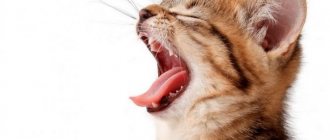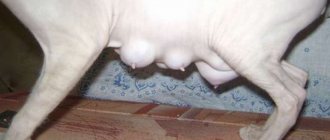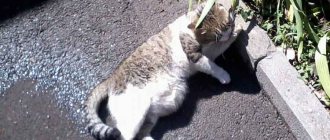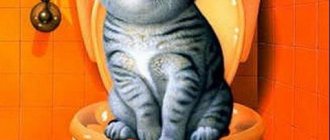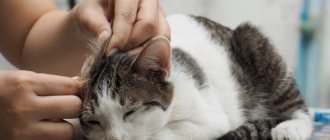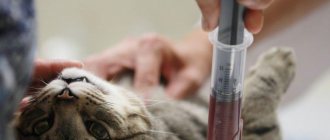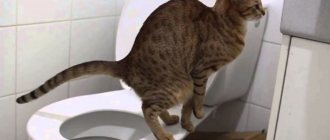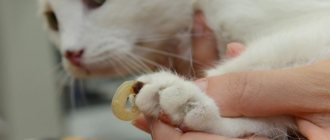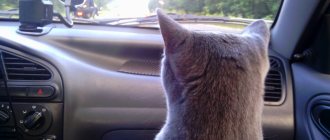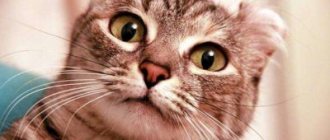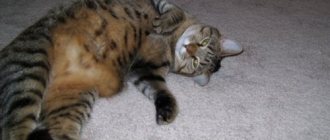Obvious rumbling and seething in the animal’s stomach is a sign of increased gas formation. If these phenomena are repeated many times, the animal shows anxiety, most likely it has an organic or functional digestive disorder.
Severe seething usually accompanies fermentative dyspepsia, which develops in the upper intestines. In case of indigestion in the lower sections (putrefactive dyspepsia), there is usually no seething, but foul-smelling gases are actively released.
Causes of rumbling and seething
Increased gas formation causes serious discomfort in animals. Its reasons can be simple, for example, a change in food or a transition from natural food to artificial food, mixed nutrition.
In young kittens, dyspepsia often develops if the cat eats artificial food and drinks mother's milk. A kitten may have dyspepsia due to congenital lactose intolerance. Such kittens need special nutrition. Otherwise they will die.
Quite often, a cat develops dyspepsia even when fed high-quality food from well-known brands, since these foods contain a lot of preservatives and fiber, and dry food contains a lot of drying agents and flavorings.
Unfortunately, dyspepsia caused by such foods is not the worst option for your pet.
The cause of active seething in the stomach can be very serious illnesses.
The cause of rumbling and seething in the animal’s digestive system can be serious diseases of the organs involved in digestion, bacterial intestinal infections and severe viral diseases of the cat.
Inflammation of the pancreas often leads to enzymatic deficiency and, as a result, fermentative dyspepsia. If the animal's bowel movements are abnormal, vomiting occurs, the animal is bothered by nausea, and refuses to eat - this may be a manifestation of pancreatitis.
If the animal has a bloated abdomen, purulent rhinitis and conjunctivitis, high fever and general weakness, it is bothered by flatulence, accompanied by strong rumbling in the stomach, it may have a viral infection that is severe for a cat (calcivirosis or rhinotracheitis).
Peptic ulcers of the stomach and duodenum, gastritis, colitis, enteritis, intestinal dyskinesia - all these diseases can be accompanied by rumbling, because the process of digesting the bolus of food and moving feces is disrupted. Usually these diseases are accompanied by stool disorder and other symptoms unpleasant for the animal.
Inflammatory processes in the mucous membrane of the gastrointestinal tract, indigestion, and rumbling can be caused by certain medications (anti-inflammatory, hormones, and others).
Aerophagia, caused by stress or other reasons, can lead to rumbling in the animal’s stomach. At the same time, his abdomen is swollen, and upon palpation the abdominal wall is tense.
Diseases of the liver, gall bladder, its ducts (dyskinesia), and oncological processes affecting the digestive organs of an animal can lead to dyspepsia and the resulting seething. In addition to loud sounds in the stomach, the animal also exhibits more dangerous symptoms: diarrhea, vomiting (sometimes with blood), emaciation of the animal, and in severe cases, refusal to eat.
If the animal's stomach growls strongly, diarrhea occurs, and the stools are foamy and foul-smelling, the cat has general weakness, and refuses to eat, then this is a reason to suspect an intestinal infection.
Gurgling sound in a cat's stomach
The gurgling sound we hear from our stomach is often simply the sound of our digestion . It has the medical name borborygmus and is not exclusive to our species. We may hear a similar gurgling sound in our cat's stomach, sometimes more than others. They can even be so loud that they are having fun, especially if you are trying to spend the day with your feline friend and are woken up by gurgling noises. However, while healthy borborogma sounds are expected, if you listen to them too often, it could be a sign that something is wrong.
Treatment
If the only manifestation of dyspepsia is loud rumbling along the animal’s intestines, then it should be:
- protect from stress;
- feed in small portions, but more often, in a specially designated place where no one will disturb the animal;
- you need to choose the right food, you can consult a specialist;
- if an animal eats artificial food, it is advisable not to spoil it with treats from your table, “human” food often provokes dyspepsia;
- trash cans should be kept out of the animal's reach.
If this strategy is not successful or additional alarming symptoms appear, you should definitely take your cat to the veterinarian.
Cat digestion
During normal digestive activity, noises are produced by gastrointestinal movements and the corresponding release of gas. After the cat has eaten, you can put your ear on your stomach and listen to a few soft sounds.
However, it is not only when the stomach is full that we can hear these noises. When a cat's belly is empty, a similar gurgling sound is heard. This is because stomach acid and gases are still active, and the emptiness of the organ may be reflected in its sound. Unless you're going to spoil your cat as much as we do, it's unlikely that a domestic cat with easy access to food would end up in this situation.
You eat borborygma sounds that can be amplified if the cat swallows a lot of air while eating. This can happen when we give them their favorite food, which they swallow too easily or anxiously. If this happens regularly, you can prevent it by feeding your cat smaller, more frequent meals.
In addition to the usual gurgling sounds we can expect to hear, there may be some that are cause for concern. This may be when they are stronger than usual for a long period or when they appear along with more symptoms. We'll see in later sections whether this could mean trouble for your cat's insides .
Worm infestations
Mild forms may not be noticed, but severe forms are easily diagnosed by a number of symptoms:
- pear-shaped swollen belly;
- yellow-green color of stool;
- excessive thinness;
- frequent diarrhea.
Worms eat food faster than it can be digested. During their life, parasites emit a large amount of gases and toxins, which provoke active seething.
Treatment methods. If this problem exists, the animal must be treated. A veterinarian or a specialist at a pharmacy for animals will help you decide on the best method. Today, many dosage forms are available:
- suspensions or pastes - the kit usually includes a syringe with which you can take the required amount and squeeze it over the animal’s cheek;
- drops - they are intended for external use to combat fleas, which can significantly worsen the quality of life of a pet;
- tablets are a concentrate for preparing a medicinal solution; in their pure form it is difficult to force a cat to swallow them (read more about how to give a cat an anti-worming tablet).
All these means provide quick and complete elimination of parasites. What type of medication to choose depends on the individual characteristics of the pet.
Gastrointestinal tract disorders.
In this section, we will look at some disorders or conditions that can affect digestion . One of them could be the reason why your cat is making these gurgling sounds:
- Foreign body although this is a more common problem for larger animals such as dogs, cats are also known to swallow objects they shouldn't. Foreign bodies such as strings, strings or plastic parts can interfere with your intestinal transit and cause problems. These are not just gurgling sounds. This can cause reflux, discomfort, or even bowel perforation. Therefore, if your cat is vomiting and has no appetite to make the gurgling sound worse, you should consult your veterinarian...
- Malabsorption is the medical term for the inability to properly digest food where nutrients should enter the bloodstream. There are several reasons for this phenomenon. In addition to stomach sounds, our cat may increase her food intake but maintain the same weight or even begin to lose something. The same can happen with some parasites. This usually occurs due to problems with the pancreas, but must be treated by a doctor...
- Indigestion Although more common in dogs, cats can also suffer from digestive problems. If a cat has easy access to rich food (such as a neighbor who likes to spoil other people's pets) or if it eats too much too quickly, it can cause stomach upset accompanied by loud bowel sounds. If food gets stuck, it can cause intestinal damage, which is not only noisy, but can also be very painful. Naturally, this may work, but chronic indigestion will require medical attention...
- Dysbacteriosis is when the flora of a cat's digestive tract is disturbed. The microbial action of this flora is disrupted and an imbalance occurs, which sometimes leads to an accumulation of intestinal flora, which can be problematic. If this happens, gurgling sounds are just one possible problem. If this balance is not restored naturally, a veterinarian should be consulted.
Stomach gurgles when poisoning is suspected
Many animals are free-range (especially if the cat lives in a private home). Thus, it is very difficult for the owner to monitor the animal’s proper diet. Even if at home the cat eats the best food or exclusively natural, fresh products, no one can guarantee that the cat will not pick up something on the road or eat a mouse (and rodents are carriers of many diseases). Poisoning can cause both a rage in the stomach and more serious consequences, including death.
What to do in this situation? The first thing to start treatment with is gastric lavage. It is necessary to induce vomiting in the cat as soon as possible, for which you can pour a weak solution of potassium permanganate or hydrogen peroxide into the mouth (0.5 teaspoon of peroxide per 3 kg of weight, diluted in a glass of water). If there is no vomiting, and the cat gets worse, it is necessary to perform gastric lavage at the veterinary clinic.
In any case, seething in a cat’s stomach is an abnormal situation and requires attention from the owner of the animal. If there are no other symptoms besides seething, there is no point in worrying. You just have to limit the animal’s food intake and keep the cat on a gentle diet. If other symptoms listed above are observed, the help of a qualified veterinarian is necessary.
What to do?
If gurgling in the abdomen is not provoked by pathologies, specific therapy for this condition is not required. It is enough for owners to protect the cat from stress. Then you need to change the diet, excluding from it the food that he prepares for himself. It is recommended to feed your cat natural food, but you can diversify the menu with industrial supplements. It is better to entrust the choice in favor of one of them to your veterinarian. Feeding the cat should be done indoors, where no one will disturb her. It is recommended to make smaller portions, but feed the animal more often. In order not to provoke food poisoning from spoiled food, the trash can must be installed in a place inaccessible to the cat.
Source
What to do?
If gurgling in the abdomen is not provoked by pathologies, specific therapy for this condition is not required. It is enough for owners to protect the cat from stress. Then you need to change the diet, excluding from it the food that he prepares for himself. It is recommended to feed your cat natural food, but you can diversify the menu with industrial supplements. It is better to entrust the choice in favor of one of them to your veterinarian. Feeding the cat should be done indoors, where no one will disturb her. It is recommended to make smaller portions, but feed the animal more often. In order not to provoke food poisoning from spoiled food, the trash can must be installed in a place inaccessible to the cat.
Source
Inflammatory bowel disease
If your cat makes frequent bowel sounds over a long period of time, a pathology may occur that affects the bowel. If you have vomiting, weight loss, or other symptoms, it may be inflammatory bowel disease. This is more common in older adult cats.
Symptoms may be mild and nonspecific and may not be easy to diagnose. This is the reason why an endoscopy and/or biopsy may be required. This serves to ensure that inflammatory bowel disease is present and not some other pathology such as intestinal lymphoma. If the cat is positive for inflammatory bowel disease then this likely explains the bowel sounds. As we can see, although your cat's digestion noises are generally not a cause for concern, we should pay attention in case there may be something more menacing behind these sounds...
Source
Pests
Sometimes loud sounds coming from your cat's stomach may not be normal digestion. They may indicate the presence of internal parasites. Parasites love coccidia or lamblia, which also often causes diarrhea. Although, in particular, healthy adult cats may not show any signs of parasitic presence. In animals that are particularly young, old or already sick, they can pose a serious threat as they limit nutrients and can lead to dehydration...
Therefore, if your kitten is experiencing regular digestive problems with the stomach and/or intestines, you should seek veterinary advice. Even if you have maintained your deworming schedule, parasites can still break through. This could be due to something they ate, or they were unlucky enough to be exposed to a parasite that is not covered by the deworming formula...
It is not always easy to identify a specific parasite. This is why repeat stool samples may be necessary. If you think your cat's gurgling sounds are due to parasites, you should ask your veterinarian for the correct formula. Not only can they decide on the best treatment, but they can also confirm that an infection has occurred and rule out any other pathology that may be present...
